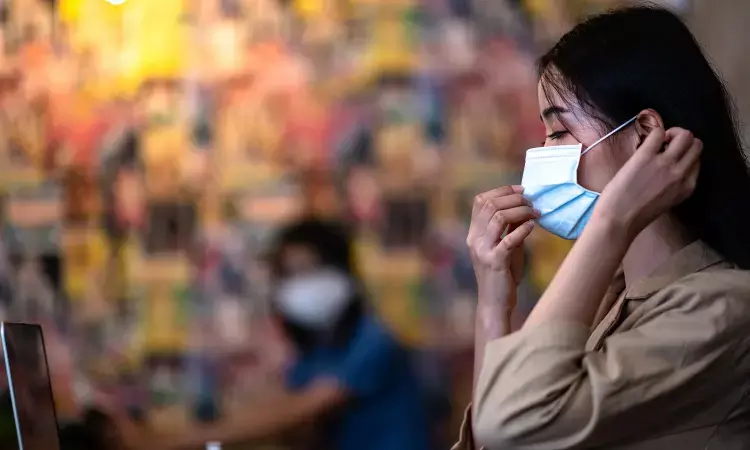- Home
- Medical news & Guidelines
- Anesthesiology
- Cardiology and CTVS
- Critical Care
- Dentistry
- Dermatology
- Diabetes and Endocrinology
- ENT
- Gastroenterology
- Medicine
- Nephrology
- Neurology
- Obstretics-Gynaecology
- Oncology
- Ophthalmology
- Orthopaedics
- Pediatrics-Neonatology
- Psychiatry
- Pulmonology
- Radiology
- Surgery
- Urology
- Laboratory Medicine
- Diet
- Nursing
- Paramedical
- Physiotherapy
- Health news
- Fact Check
- Bone Health Fact Check
- Brain Health Fact Check
- Cancer Related Fact Check
- Child Care Fact Check
- Dental and oral health fact check
- Diabetes and metabolic health fact check
- Diet and Nutrition Fact Check
- Eye and ENT Care Fact Check
- Fitness fact check
- Gut health fact check
- Heart health fact check
- Kidney health fact check
- Medical education fact check
- Men's health fact check
- Respiratory fact check
- Skin and hair care fact check
- Vaccine and Immunization fact check
- Women's health fact check
- AYUSH
- State News
- Andaman and Nicobar Islands
- Andhra Pradesh
- Arunachal Pradesh
- Assam
- Bihar
- Chandigarh
- Chattisgarh
- Dadra and Nagar Haveli
- Daman and Diu
- Delhi
- Goa
- Gujarat
- Haryana
- Himachal Pradesh
- Jammu & Kashmir
- Jharkhand
- Karnataka
- Kerala
- Ladakh
- Lakshadweep
- Madhya Pradesh
- Maharashtra
- Manipur
- Meghalaya
- Mizoram
- Nagaland
- Odisha
- Puducherry
- Punjab
- Rajasthan
- Sikkim
- Tamil Nadu
- Telangana
- Tripura
- Uttar Pradesh
- Uttrakhand
- West Bengal
- Medical Education
- Industry
Individuals with Diabetes Up to Four Times More Likely to Develop Long COVID-19

A new study reveals that diabetes is a potential risk factor for post-acute sequelae of COVID-19 (PASC), also known as long COVID-19, a range of post-COVID-19 symptoms such as brain fog, skin conditions, depression, and shortness of breath. The findings were presented as a late-breaking poster session at the 82nd Scientific Sessions of the American Diabetes Association® (ADA) in New Orleans, LA.
Research shows that up to 10 to 30 percent of individuals that had COVID-19 may experience long COVID-19. Post-COVID-19 conditions are more prevalent in those with severe cases of COVID-19. This is particularly concerning for patients with diabetes, a patient population at increased risk of severe COVID-19 infection. Now, researchers are working to understand whether diabetes is also a risk factor for long COVID-19.
In order to determine the impact of diabetes on the development of long COVID-19 following an initial COVID-19 infection, the study included all peer-reviewed full-text observational research studies published in English between January 1, 2020 and January 27, 2022 that reported on the risk of PASC in people with and without diabetes with a minimum of four-weeks follow-up after COVID-19 diagnosis, and narratively synthesized results.
Findings show that 43% of studies identified diabetes as a potent risk factor for PASC. However, this conclusion is limited by the heterogeneity of studies with regard to PASC definitions (e.g., ongoing symptoms of fatigue, cough, dyspnea etc.), populations at risk (hospitalized vs. non-hospitalized populations), and follow-up times (ranging from four weeks to seven months).
"As time goes on, we are seeing the negative impacts that long COVID has on the daily lives of patients. Though more research is needed, we now know that patients with diabetes are at a disproportionate risk of long COVID and that these patients should be closely monitored," said Jessica L Harding, PhD, assistant professor at Emory University's School of Medicine in Atlanta, GA and lead author on the study. "Careful monitoring of glucose levels in at-risk individuals may help to mitigate excess risk and reduce the burden of lingering symptoms that inhibit their overall wellbeing."
The authors note that more high-quality studies across multiple populations and settings are needed to determine if diabetes is indeed a risk factor for PASC.
Dr Kamal Kant Kohli-MBBS, DTCD- a chest specialist with more than 30 years of practice and a flair for writing clinical articles, Dr Kamal Kant Kohli joined Medical Dialogues as a Chief Editor of Medical News. Besides writing articles, as an editor, he proofreads and verifies all the medical content published on Medical Dialogues including those coming from journals, studies,medical conferences,guidelines etc. Email: drkohli@medicaldialogues.in. Contact no. 011-43720751


